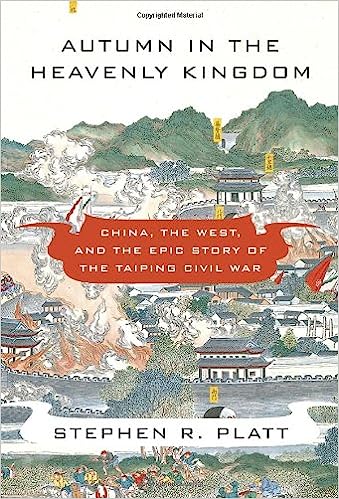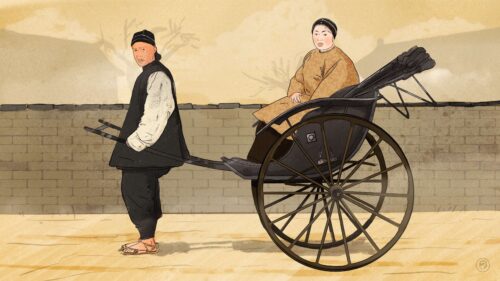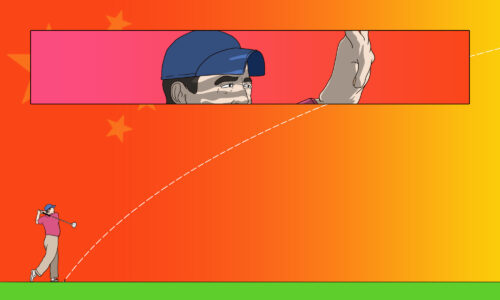This is book No. 24 in Paul French’s Ultimate China Bookshelf.

Blurbs:
“The author raises a curtain to show us events largely unknown in the West — yet achingly familiar as well.”
—Kirkus
“A splendid example of finely calibrated historical narrative…It is a tragic and powerful story.”
—Jonathan Spence
“A marvelous account of a largely forgotten but major event. Combines great scholarship with a driving narrative and sharp characterization.”
—Jonathan Fenby, author of The Penguin History of Modern China
“Stephen Platt brings to vivid life a pivotal chapter in China’s history that has been all but forgotten…A fascinating work by a first-class historian and superb writer.”
—Henry Kissinger
About the author:
Stephen R. Platt is an American historian and writer. He is currently a professor of Chinese history at the University of Massachusetts Amherst. Platt holds a Ph.D. from Yale and now specializes in the 19th century and the Qing dynasty’s foreign relations. In 2007 he published Provincial Patriots: The Hunanese and Modern China, and then his book on the Taiping Rebellion, Autumn in the Heavenly Kingdom, followed by a study on the immediate period before the Opium Wars, Imperial Twilight (2018). Autumn in the Heavenly Kingdom was awarded the Cundill History Prize in 2012.
The book in 150 words:
Stephen R. Platt’s highly readable history of the Taiping Rebellion (alternatively called a civil war or revolution), Autumn in the Heavenly Kingdom, begins in 1853 with an introduction of the Qing dynasty and its faltering position. In opposition is the South China–based Taiping Heavenly Kingdom, commanded by Hóng Xiùquán 洪秀全, an ethnic Hakka and the self-proclaimed brother of Jesus. The resultant civil war lasted from 1850 to 1864, with the final remnants of the Taiping not extinguished until 1871. The conflict resulted in approximately 20 million deaths. The Western powers (including Americans, though the country was engaged in its own civil war for part of this time) observed the insurrection, sometimes intervened (Townsend Ward’s defense of Shanghai, for instance), and supplied arms. Platt shows that the armaments and early support were important factors in the eventual defeat of Taiping.
Your free takeaways:
Part of my purpose in writing this book is to help restore China to its proper place in the nineteenth-century world. China was not a closed system, and globalisation is hardly the recent phenomenon we sometimes imagine it to be. The Qing Empire was deeply integrated into the world’s economy through trade, and there were thousands of foreigners living in Hong Kong and Shanghai. By consequence the war in China was tangled up in threads leading around the globe to Europe and America, and it was watched from outside with a sense of immediacy and horror.
In all, this attack on the Taiping at Shanghai would do more to build sympathy for their cause abroad than anything that had gone before, for it brought them to the front pages. Once a cipher, now they were held us a pro-Christian, pro-Western alternative to the universally reviled Manchu rulers in Beijing.
According to this tract, the Taiping were not at all revolutionary. In fact, they were native traditionalists, continuing the legacy of all past Chinese resistance to outside conquest.
Death in those days came not just from the rain of cannons and muskets, the explosions, or the hatchets and spears. It came not just from the infection and the butchery or from the suicides. It came not just from aching famine in the war zone, where the threadbare remains of the farming population struggled to feed themselves and pay taxes to whichever body claimed control over them. There was no place to escape.
Why this book should be on your China bookshelf:
The Taiping is an almost forgotten uprising, a war nobody remembers. Even those who can point out on a map the area of the Siege of the Legations, the battlefields of the Russo-Japanese War, the Sino-Japanese War, the campaigns deep into China by the Mongols are often stumped to name more than one or two great battles of the long-running Taiping Rebellion. Contemporaneous with the American Civil War — and with a death toll 30 times higher — the Taiping remains hardly known outside China.
Yet, at the time, it was of great concern to Europe and the U.S. in terms of disrupting trade and threatening to pull China apart at the seams; even Marx wrote about it, in his journalism days, as highly disruptive to Britain’s textile trade: The ramifications of the Taiping were to be felt, knowingly or unknowingly, by the working class in Manchester, Bradford, and Glasgow.
The American Civil War is an interesting comparison: Its ramifications are still with us on a daily basis, most notably in the form of systemic racism. It can feel like the arguments of 1861–1865 are still being played out on many city streets and in ideological battles online. Not so the Taiping – nobody now claims any inheritance or inspiration from either side in the conflict. The imperial rule of the Manchus was swept away, there is no restoration movement. The Taiping are extinguished, a strange footnote in Chinese history.
Yet, as we have seen when discussing our two previous books that dealt with the role of myth and superstition in China — ETC Werner’s Myths and Legends of China and Philip Kuhn’s Soulstealers — forces like the Taiping have left a nagging ache in the back of the minds of today’s cadres and senior leaders. Analogues can be found in the Falun Gong’s persistent appeal despite repression and banning, and the occasional regional uprisings such as the Wukang Village Protests in 2011 and many others. The disaffected and angry might coalesce around local grievances (as we saw in Soulstealers) and birth mythic tales; a seemingly harmless qigong organization run by a low-level Changchun civil servant can become a global movement threatening the party-state. In this sense, the Taiping — the notion that the followers of a man believing himself to be a brother of Jesus can rise to control 30 million people across China, cause widespread death, disease, and famine, and contribute to the fall of a 267-year-old dynasty a few decades later — is not lost on the Party, from Zhongnanhai down. When someone, however odd their beliefs, becomes a catalyst for those who dislike the ruling authorities, all bets are off.
Finally, we should note that Platt’s history is in-depth and revelatory, yet also highly readable, full of characters while also understanding how the world reacted to this momentous event at the time. Platt brings back to life the leaders and the rank and file of the Taiping, a group largely lost to us in terms of being able to hear and smell it. For that feat of literary historical writing alone, Autumn in the Heavenly Kingdom deserves its place on our Ultimate China Bookshelf.
Next time:
Dark times, high death tolls, strange thoughts…enough, time for a little light relief — even if comedy is not top of the entertainment agenda right now in China! Did you hear the one about the rabbi, the priest, and the PLA officer who walked into a bar? Oh, never mind, best not! Rather, a trio of classic business (mis)adventures in China to both inform and caution. We’ll start with one man’s attempt to bring ’80s London’s biggest pop sensations to China…Yes, Beijing, it’s time to wake up before you go-go…
Check out the other titles on Paul French’s Ultimate China Bookshelf.







